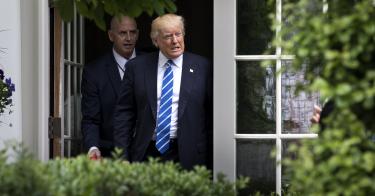In his April 29 speech marking his first 100 days in office, President Trump touched on the subject of regulations only briefly. Indeed, it took up all of one sentence.
“We have slashed burdensome regulations, and imposed a policy that for each new regulation, two regulations must be erased from the books,” he said.
It’s understandable that the topic rated little more than a mention. Mr. Trump had other accomplishments to tout, and his speech was meant to be more of a rallying cry than a detailed description of any one subject. But the good work his administration is doing on regulations deserves more attention.
Why? Don’t make the mistake of assuming regulations don’t affect you — or that they do only if you run a business. Regulations function as a kind of hidden tax, affecting all of us in numerous ways, both direct and indirect.
By making it harder to start a business, or continue to operate one, they interfere in the free-market enterprise that has been the hallmark of the American economy from the beginning. Every dollar that goes toward regulatory compliance is one less dollar that can be used to hire new workers or find ways to improve a business.
And the extra costs that these companies find themselves facing? They get passed along to everyone else in the form of higher costs. Not just their direct customers, mind you, but others down the line. After all, if a regulation forces a local business to spend more than it budgeted for, it’s going to have to raise prices — and that often creates a ripple effect.
So no matter who you are, regulations matter. And so do the steps the Trump administration has been taking to roll back unnecessary ones in its first 100 days. According to a recent Daily Signal article, they include:
• Rule on retirement savings. Promulgated during President Obama’s last full month in office, this rule allowed state and some local governments to create public retirement funds. That may sound good, but the rule essentially encouraged employers to drop workers from private retirement plans and dump them in the public option, which lacked any oversight or safeguards, prevented employers from contributing to workers’ plans, and could strip individuals of control over their savings. (Thus far, Mr. Trump has signed an order to reverse the local-government component; he awaits Senate passage of the state-government component.)
• Regulations on coal mining. These Obama-era rules, White House Press Secretary Sean Spicer said, “threatened to put domestic extraction companies and their employees at an unfair disadvantage.” Repeal, he added, could save U.S. businesses as much as $600 million annually.
• Rule preventing states from withholding funds from Planned Parenthood. Another last-minute regulation from the outgoing Obama administration, this rule “would have taken away the right of states to set their own policies and priorities for Title X family-planning programs,” Mr. Spicer said.
• Regulations for wildlife preserves in Alaska. These regulations restricted Alaska’s ability “to manage hunting of predators on national wildlife refuges in Alaska,” Mr. Spicer said. In a formal statement, Rep. Liz Cheney, Wyoming Republican and daughter of former Vice President Dick Cheney, called the rule “another example of the federal government’s determination these past eight years to destroy a state’s ability to manage their wildlife.”
• Rule on internet privacy. Yes, this was also a late entry for the Obama administration, which was obviously on a rule-making binge in its waning days. This one, Mr. Spicer said, “sought to force “new privacy standards on internet service providers, allowing bureaucrats in Washington to pick winners and losers in the industry.” Adds Sen. Jeff Flake, Arizona Republican, “Repealing it “empowers consumers to make informed choices on if and how their data can be shared.”
As the saying goes, “Thank goodness we’re not getting all the government we’re paying for.” By reducing the burden of unnecessary regulations, the Trump administration is ensuring that we’ll have less government — and pay less for it.
Let’s hope they keep doing it, well beyond the first 100 days.
This piece originally appeared in The Washington Times


